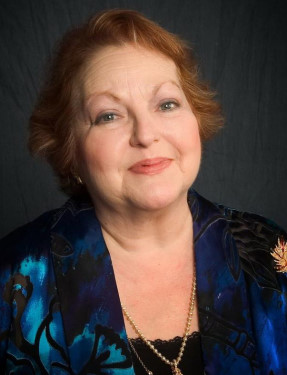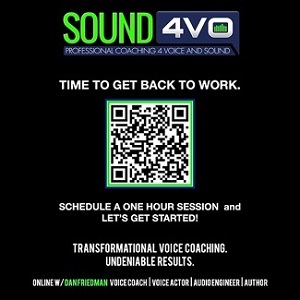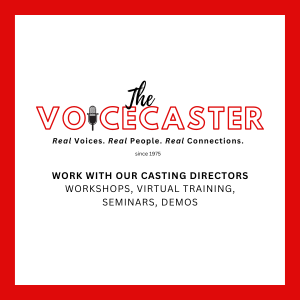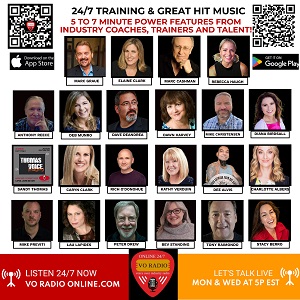|
Celebrity Voice-Over Impersonations:
Be Cautious! Words to the Wise …
By Bettye Zoller
Voice Talent / Trainer / Producer
VoicesVoices
 Have you been asked to impersonate a celebrity voice? Do so only with great caution! Have you been asked to impersonate a celebrity voice? Do so only with great caution! Celebrities and their estates quite understandably want to protect the use of and income from their recognized voices. And this can land a voice impersonator in legal hot water.
Let my experiences, research and opinions be a guide for you. Of course, legal counsel is your best course when deciding what to do.
BETTE, MICKEY & JOAN
Cases in point:
A while ago, entertainer Bette Midler won a lawsuit when her voice was impersonated by a voice-over talent on a national commercial. I believe the person sang as well as spoke in that commercial, but I am not certain.
The Disney organization is known as one that is particularly alert to infringements of copyrights.
When I was Commercial Creative Director of a large production firm, we producers were warned to be particularly wary of writing song parodies or voice-over copy using any type of Disney material or references. You can't be “too careful” was what we were told when creating industrial shows and commercial jingles and voice-over scripts.
When I impersonated Joan Rivers - while I was working for a large advertising agency that had hired me to do her voice on a commercial - I was disappointed when my agent phoned to say that the spot would never be aired because the ad agency had been told it was too dangerous and it should be scrapped.
I was paid a session fee (it was a union job, of course), but unfortunately lost those juicy residuals I was hoping to get from it.
ESTATES, TOO
When I voiced Marilyn Monroe for a popular soft drink commercial, that spot was also scrapped before airing. The advertising agency told me that the legal department had deemed it “too dangerous because the Monroe Estate might take action.”
I have heard from friends in our industry with experience in these matters that the estates of deceased stars are particularly aware of impersonations and often take action.
The Elvis estate is known for having eyes and ears peeled for infringements of all types.
“But what about all those Elvis impersonators?” you may ask. Well, that’s “small potatoes.” I suspect that lawsuits happen when large-scale exposure and big-money projects are involved.
Also, it’s important to realize that a parody is different from impersonating a voice.
SOUND ADVICE
Check this advice from the Media UK web site(www.mediauk.com/the_knowledge/i.muk/Copyright_and_Adverts).
It is written by David Baynham and based on work by Lee Climpson and Ian Hickling:
“Using a VO to sell an item is completely different from . . . doing a parody impression. (A celebrity) may not want to sell (a particular) product or endorse that item. He also could have voiced it, so he can sue for loss of earnings and defamation of character if he is against that product.
"It could get very expensive for you as the writer and the station for broadcasting it. If you, the voice-over talent, have written the copy and voiced it, you then would become the person being sued!” (December 2007)
Simon Rushton’s Radio Advertising web site (www.radioadvertising.org.uk) is a must-visit for anyone interested in free advice on advertising projects. Rushton says this:
“The client phones me and tells me he has an idea. It’s using an impression of ______ with the final line (a famous quote from that person). … I have to explain that we could be sued. This celebrity is available to do voice-overs. He makes a portion of his living with that kind of work. An impression of him is a form of theft.”
CONTRACT CLAUSES
There also is a possibility that a certain celebrity figure is tied to certain corporations from which they are paid as a product spokesperson. Thus, they may have a contract prohibiting him or her from endorsing rival products.
TV actors often have clauses in contracts prohibiting them from performing in commercials of any kind. This is especially true of soap opera stars.
Many entertainment personalities who also do voice-overs must sign non-compete contracts in which they agree to not endorse another automobile or fast food chain.
Even we anonymous VO people - who are not recognizable “stars” - are often asked by producers to sign non-compete clauses. The voice must be recognizable, in most of these cases, however.
IT’S ILLEGAL!
People often want a celebrity voice in a commercial or a narration, and therefore will pay premium prices for celebrities. That’s why lawsuits are high-dollar!
So remember this:
It is illegal to impersonate people in commercials without their permission. Before you, as a voice-over talent, impersonate a living or deceased star, make sure that the people hiring you have obtained copyright clearance.
If your agent books you on a celebrity job, he or she probably will have taken care of this precaution. However, it might not hurt to "remind" the agent of legalities.
Even if you personally are not sued for impersonating a famous voice in a commercial, you might have to undertake time-consuming duties connected with testifying, with legal depositions or court appearances.
Agencies, production houses, and broadcast voices are urged to be wary.
Internet voice-over pay-to-play sites should be wary about accepting voice seeker’s ads for impersonations, too. These are numerous.
I’ve spoken out about this in various arenas and emailed pay-to-play voice-over sites about it, but the celebrity voice ads are still there.
ASK A LAWYER
Note: I’m not a lawyer (though I play one on TV).
This article is meant only as information that I have gleaned from reading articles and visiting web sites on this subject. I make no claim as to the accuracy of this information. It comes from my knowledge of the field and research I’ve conducted over a period of time. Everyone is advised for legal matters to seek the counsel of your legal advisors for the final actions necessary. I am not legal counsel. This article contains my opinions only.
Bettye Zoller, owner of VoicesVoices, is one of the nation's best-known voice, speech, acting, and voice-over coaches, and is a winner of ADDY, Clio, Golden Radio and Audie Awards. She holds advanced degrees from three universities, has served on university faculties for 30 years, is the Feagin Artist Guest Professor at Tulsa University, and presents workshops sponsored by Women in Film and Television. Her home is Dallas but she teaches, by invitation, worldwide. She is also a professional audio engineer producer, owns a recording studio in Dallas, and is a Simon & Schuster audiobook author and reader.
Email: btzol@aol.com
Web: www.voicesvoices.com
|
|
|
On Michael Langsner's Voice-Over Roadmap Podcast
Get your bi-weekly dose here ... all things VO!
Inspiring interviews help your VO career
For essential voice-over business strategies
As of the NEW website launch, 03/22/2012




.png)




Thanks, Doug
There are so many auditions on P2P sites that imply that an impersonation is required, 'Think celeb's name', or 'Sounds like celebrity'.
All the best,
Lee.